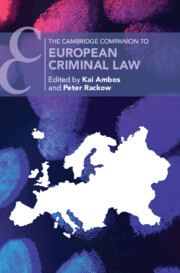Book contents
- The Cambridge Companion to European Criminal Law
- Cambridge Companions to Law
- The Cambridge Companion to European Criminal Law
- Copyright page
- Contents
- Notes on Contributors
- Preface
- Table of Cases
- Abbreviations
- Part I Foundations of European Criminal Law
- Part II Purposes and Principles
- Part III European Substantive Criminal Law
- 7 Protection of the Financial Interests of the EU (Art. 325 TFEU)
- 8 Cross-Border Crimes
- 9 Further Areas
- Part IV European Criminal Procedure
- Part V Institutions
- Part VI Perspectives
- Bibliography
- Index
- References
9 - Further Areas
from Part III - European Substantive Criminal Law
Published online by Cambridge University Press: 09 February 2023
- The Cambridge Companion to European Criminal Law
- Cambridge Companions to Law
- The Cambridge Companion to European Criminal Law
- Copyright page
- Contents
- Notes on Contributors
- Preface
- Table of Cases
- Abbreviations
- Part I Foundations of European Criminal Law
- Part II Purposes and Principles
- Part III European Substantive Criminal Law
- 7 Protection of the Financial Interests of the EU (Art. 325 TFEU)
- 8 Cross-Border Crimes
- 9 Further Areas
- Part IV European Criminal Procedure
- Part V Institutions
- Part VI Perspectives
- Bibliography
- Index
- References
Summary
Chapter 9 is titled ‘Other Areas’. Hence, it examines the Unions competence to require Member States (‘MS’) to harmonize substantive criminal law in certain areas, in particular its competence to require MS to set out criminal law offences and penalties in ‘further areas’, besides the cross-border crimes covered by Article 83(1) TFEU and the PIF Directive. We focus on Article 83(2) TFEU and divide the chapter into four parts. The first part traces the development of the EUs competence in the further areas of substantive criminal law prior and after the Treaty of Lisbons entry into force. The second part provides an overview of further harmonized areas, with a special focus on the areas of environmental protection, market abuse and protection of the financial sector, migration and employer sanctions as well as discrimination and hate speech. The third part looks at possible future areas of harmonization, while the fourth part concludes the chapter by discussing bits and pieces of a general part of substantive criminal law found in the existing harmonization measures at the EU level.
Keywords
- Type
- Chapter
- Information
- The Cambridge Companion to European Criminal Law , pp. 206 - 228Publisher: Cambridge University PressPrint publication year: 2023

